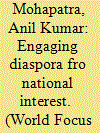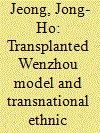| Srl | Item |
| 1 |
ID:
128199


|
|
|
|
|
| Publication |
2014.
|
| Summary/Abstract |
The growing influence of diasporas on foreign affairs and the international behavior of the states has been a worldwide academic finding and a reported fact. As independent actors they have operated as lobbies which have actively influenced homeland (ancestral or kin-states) foreign policies and that of the host lands as well (Shain et al 2003). Especially the developing countries in their mission of development have tried to rope in their communities abroad in the process. This global phenomenon of diaspora-homeland linkage has debate on economic and political systems, national culture and international relations.
|
|
|
|
|
|
|
|
|
|
|
|
|
|
|
|
| 2 |
ID:
109168


|
|
|
|
|
| Publication |
2011.
|
| Summary/Abstract |
This article aims to describe the historical background of international ethnic migration in Central and Eastern Europe. The rise and fall of the Habsburg Empire in Central Europe and the Ottoman Empire in Southeastern Europe has been the underlying cause of many ethnic migration flows in Central and Eastern Europe in the post-communist era. Moreover, the German Ostkolonisation, border changes after the two World Wars, and interstate migration in the former Soviet Union caused a large pool of potential ethnic migrants. In addition to the description of this historical background, this article contains a description of important contemporary ethnic migration flows that originate from the aforementioned historical developments, and a discussion of future developments of ethnic migration in Central and Eastern Europe.
|
|
|
|
|
|
|
|
|
|
|
|
|
|
|
|
| 3 |
ID:
076747


|
|
|
|
|
| Publication |
2007.
|
| Summary/Abstract |
Over the past fifteen years, Hungarian nationalists have been redefining membership in the Hungarian nation to include all Hungarians in the region, irrespective of citizenship. This deterritorialised notion of the nation has been given increased discursive and institutional legitimacy. But ethnic Hungarians from Romania who have gone to Hungary in search of work have not discovered national unity. Rather, the vision of national inclusion preferred by elites has been met by the reality of economic and national exclusion engendered through labour migration. The migrants' national self-understandings have taken shape not in accordance with the wishes of nationalist elites, but rather in response to the economic imperatives of labour migration. Rather than deducing the salience of national unity from its political privileging, the purpose of this paper is to explain how national disunity is experienced, constituted and reproduced in the context of ethnic Hungarian labour migration.
|
|
|
|
|
|
|
|
|
|
|
|
|
|
|
|
| 4 |
ID:
128185


|
|
|
|
|
| Publication |
2014.
|
| Summary/Abstract |
Etymologically 'diaspora' means any people or ethnic population forced or induced to leave their traditional homelands; being dispersed throughout other parts of the world, and the ensuing developments in their dispersal and culture. Historically, the terms 'diaspora' was initially uses by the ancient Greeks to refer to citizen of grand city who migrated to a conquered land with the purpose of colonization to assimilate the territory into the empire. The original meaning was cut off from the present meaning when the old testament was translated to Greek: the word diaspora was used to refer specifically to the populations of Jews exiled from Judea in 586 B C by the Babylonians, and Jerusalem in 136 AD by the Roman empire.
|
|
|
|
|
|
|
|
|
|
|
|
|
|
|
|
| 5 |
ID:
158093


|
|
|
|
|
| Summary/Abstract |
Diverse types of mobility have emerged in contemporary China, among which consumption-led ethnic retired migrants have received little academic attention. This study addresses the seasonal mobility of retired Tibetan migrants who previously had careers in governmental and public sectors in Tibet. After retirement, they purchase second-home apartments in Chengdu for health and leisure reasons. Through semistructured interviews, nonparticipant observation, and the application of Schnell’s multidimensional model, this article analyzes the migration and adaptation experiences of retired Tibetan migrants in Chengdu. It is revealed that, physically, they reside in mixed communities and share activity spaces with the local people, and, socially, maintain their life-long social relationships and form new local relationships. They feel satisfied and comfortable in their new situation, maintain their primary identity as Tibetan, and gradually establish a sense of home in Chengdu. Their political privilege and governmental support in the destination also contribute to their positive migration and adaptation experiences.
|
|
|
|
|
|
|
|
|
|
|
|
|
|
|
|
| 6 |
ID:
128277


|
|
|
|
|
| Publication |
2014.
|
| Summary/Abstract |
This paper explores why Zhejiangcun's Wenzhou migrants and Wangjing's Chaoxianzu migrants were able to maintain and actively restructure their settlements in Beijing while Beijing's other migrant settlements either disappeared or were forced out from their original locations. Highlighting the role of the Wenzhou model in Zhejiangcun and that of the transnational ethnic ties in Wangjing, this research illustrates how certain rural migrants emerged as a new social group by utilizing their cultural capital based on native-place and ethnic ties and newly found economic power. The present study examines the urban space of Zhejiangcun and Wangjing where alternative sources of economic power and social networks were created and utilized and therefore offers a unique perspective by locating a specifically-founded ethnographic analysis within the general debate on the restructuring of post-reform urban space.
|
|
|
|
|
|
|
|
|
|
|
|
|
|
|
|